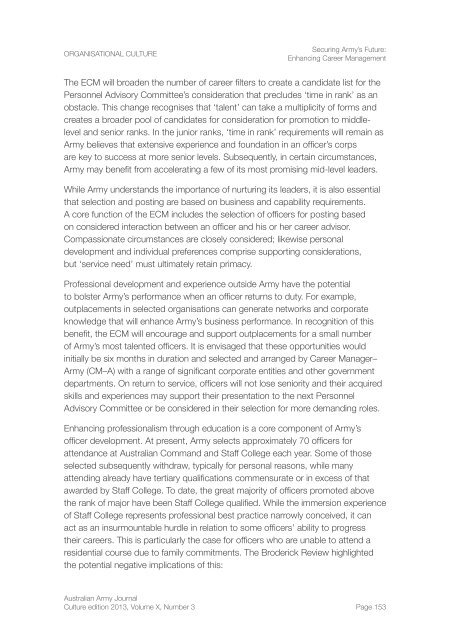Australian Army Journal
Australian Army Journal
Australian Army Journal
Create successful ePaper yourself
Turn your PDF publications into a flip-book with our unique Google optimized e-Paper software.
ORGANISATIONAL CULTURE<br />
Securing <strong>Army</strong>’s Future:<br />
Enhancing Career Management<br />
The ECM will broaden the number of career filters to create a candidate list for the<br />
Personnel Advisory Committee’s consideration that precludes ‘time in rank’ as an<br />
obstacle. This change recognises that ‘talent’ can take a multiplicity of forms and<br />
creates a broader pool of candidates for consideration for promotion to middlelevel<br />
and senior ranks. In the junior ranks, ‘time in rank’ requirements will remain as<br />
<strong>Army</strong> believes that extensive experience and foundation in an officer’s corps<br />
are key to success at more senior levels. Subsequently, in certain circumstances,<br />
<strong>Army</strong> may benefit from accelerating a few of its most promising mid-level leaders.<br />
While <strong>Army</strong> understands the importance of nurturing its leaders, it is also essential<br />
that selection and posting are based on business and capability requirements.<br />
A core function of the ECM includes the selection of officers for posting based<br />
on considered interaction between an officer and his or her career advisor.<br />
Compassionate circumstances are closely considered; likewise personal<br />
development and individual preferences comprise supporting considerations,<br />
but ‘service need’ must ultimately retain primacy.<br />
Professional development and experience outside <strong>Army</strong> have the potential<br />
to bolster <strong>Army</strong>’s performance when an officer returns to duty. For example,<br />
outplacements in selected organisations can generate networks and corporate<br />
knowledge that will enhance <strong>Army</strong>’s business performance. In recognition of this<br />
benefit, the ECM will encourage and support outplacements for a small number<br />
of <strong>Army</strong>’s most talented officers. It is envisaged that these opportunities would<br />
initially be six months in duration and selected and arranged by Career Manager–<br />
<strong>Army</strong> (CM–A) with a range of significant corporate entities and other government<br />
departments. On return to service, officers will not lose seniority and their acquired<br />
skills and experiences may support their presentation to the next Personnel<br />
Advisory Committee or be considered in their selection for more demanding roles.<br />
Enhancing professionalism through education is a core component of <strong>Army</strong>’s<br />
officer development. At present, <strong>Army</strong> selects approximately 70 officers for<br />
attendance at <strong>Australian</strong> Command and Staff College each year. Some of those<br />
selected subsequently withdraw, typically for personal reasons, while many<br />
attending already have tertiary qualifications commensurate or in excess of that<br />
awarded by Staff College. To date, the great majority of officers promoted above<br />
the rank of major have been Staff College qualified. While the immersion experience<br />
of Staff College represents professional best practice narrowly conceived, it can<br />
act as an insurmountable hurdle in relation to some officers’ ability to progress<br />
their careers. This is particularly the case for officers who are unable to attend a<br />
residential course due to family commitments. The Broderick Review highlighted<br />
the potential negative implications of this:<br />
<strong>Australian</strong> <strong>Army</strong> <strong>Journal</strong><br />
Culture edition 2013, Volume X, Number 3 Page 153

















